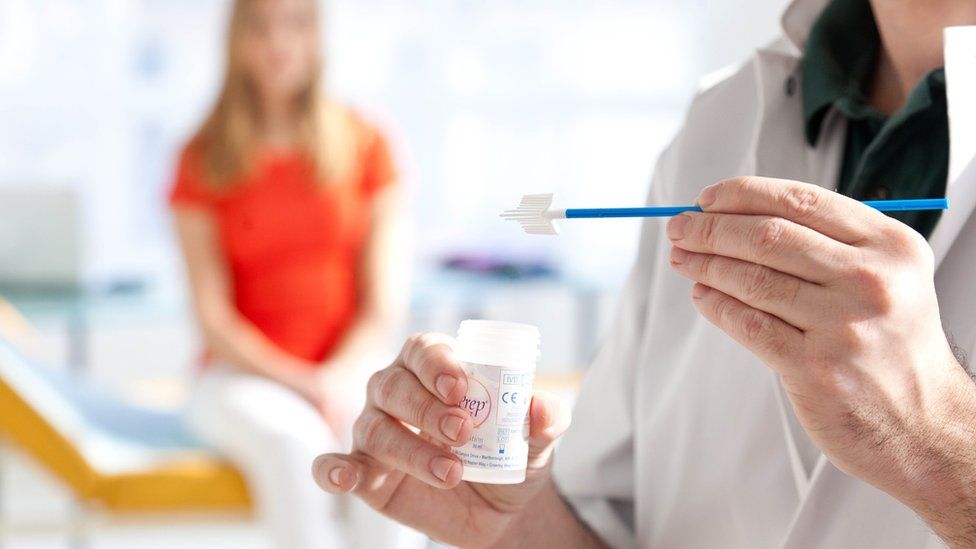No-show women at cervical screening 'unaware of test'
- Published

There was a lack of awareness of cervical screening among younger women
Nearly a quarter of women who don't make cervical screening appointments are unaware that the process even exists, according to a UK survey.
University College London researchers said more creative ways of reaching them were needed, like using social media instead of sending letters.
Women who miss out tend to be younger from poorer families or non-native English speakers, the research found.
Cervical cancer screening has been falling in the UK since 2011.
The death of reality TV star Jade Goody from cervical cancer, external in 2009 is widely accepted to have contributed to a rise in women being screened - but this effect no longer appears to be working.
The percentage of eligible women screened has dropped from 75.7% to 72.7% from 2011 to 2016 in the UK.
The UCL survey, external suggests that many young women don't get round to cervical screening, even when they intend to go.
Some 4% of women surveyed, particularly older ones, had decided not to go for a smear test at all and around 6% of women said they were completely unaware of the test.
Lack of awareness was higher in women from lower income families and ethnic minority groups.
Women are also known to find the test embarrassing and often difficult to organise.
'Worrying'
The findings are based on a survey of 3,100 women aged 24 to 64, published in the European Journal of Cancer, in which 800 said they were not up-to-date with cervical screening.
Dr Jo Waller, who led the study at UCL, said it was "worrying that so many women don't know about cervical screening".
In the UK, women aged 24-49 are invited for a smear every three years, while women 50-64 are invited every five years.
Cervical screening looks for abnormal cells in the cervix
Dr Waller said it was time to find better ways of communicating with women about screening.
"The results around lack of awareness suggest that campaigns using TV, radio, social media or face-to-face visits may be better... than relying on letters in the post, which is the current method."
She said extra reminders and specific appointment slots for first time screenings could make a difference and "potentially save lives".
Around 3,200 women are diagnosed with cervical cancer each year in the UK and 900 women die from it.
Cervical screening is thought to prevent about 2,000 deaths each year.
Sarah Williams, health information manager at Cancer Research UK, said: "We may need to be more creative in our efforts to help specific groups of women, rather than resorting to conventional 'one-size-fits-all' awareness campaigns."
Jo's Trust - a cervical cancer charity - launched #SmearForSmear campaign, external earlier this year which was shared at least 14,000 times on social media.
What is cervical screening?
It is a way of examining cells from the cervix
Screening can detect pre-cancerous and abnormal cells so they can be treated to prevent cancer
The appointment takes place at a GP surgery and lasts around 20 minutes - it shouldn't be painful
During the procedure, a nurse or GP inserts a speculum into the vagina to collect a sample of cells
Do you know the symptoms of cervical cancer?
lower back pain
pain during sex
bleeding between periods or after sex
post-menopausal bleeding
unusual vaginal discharge
- Published13 June 2016